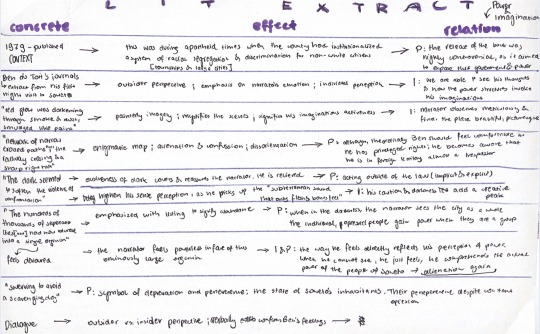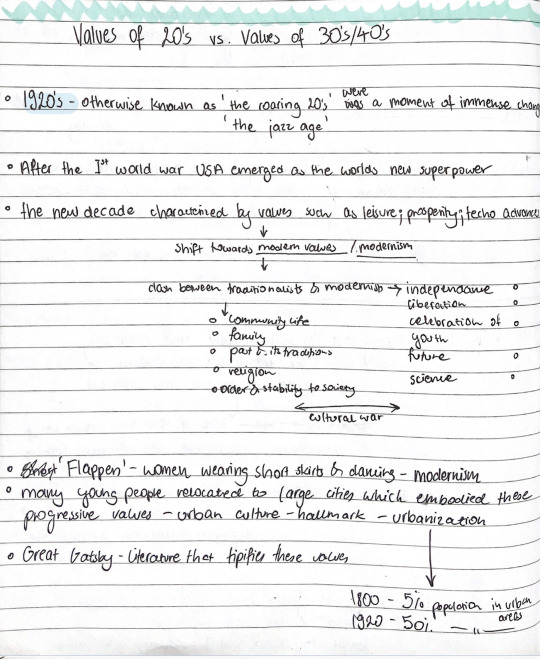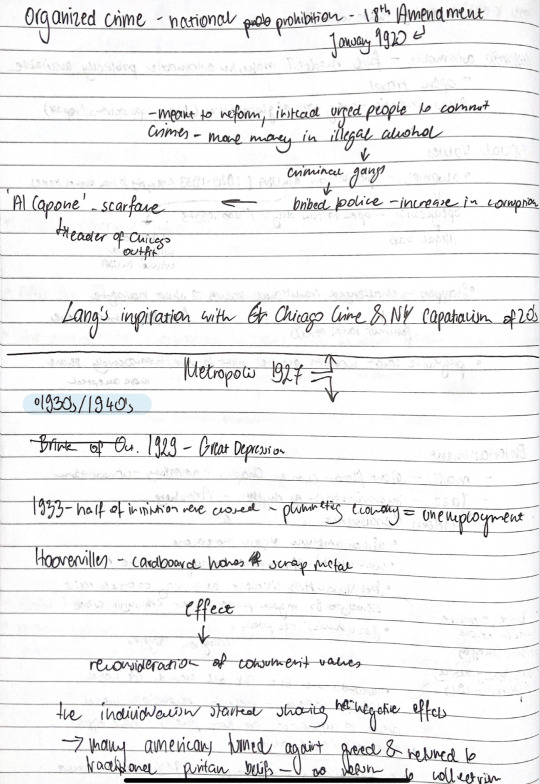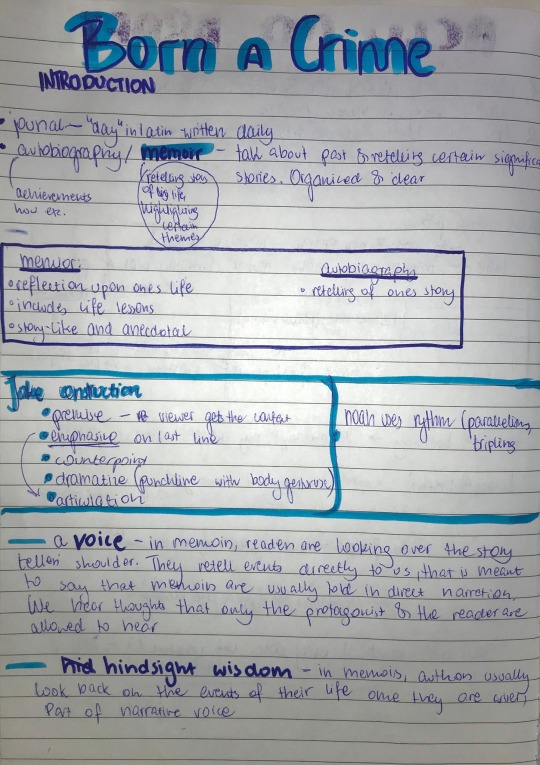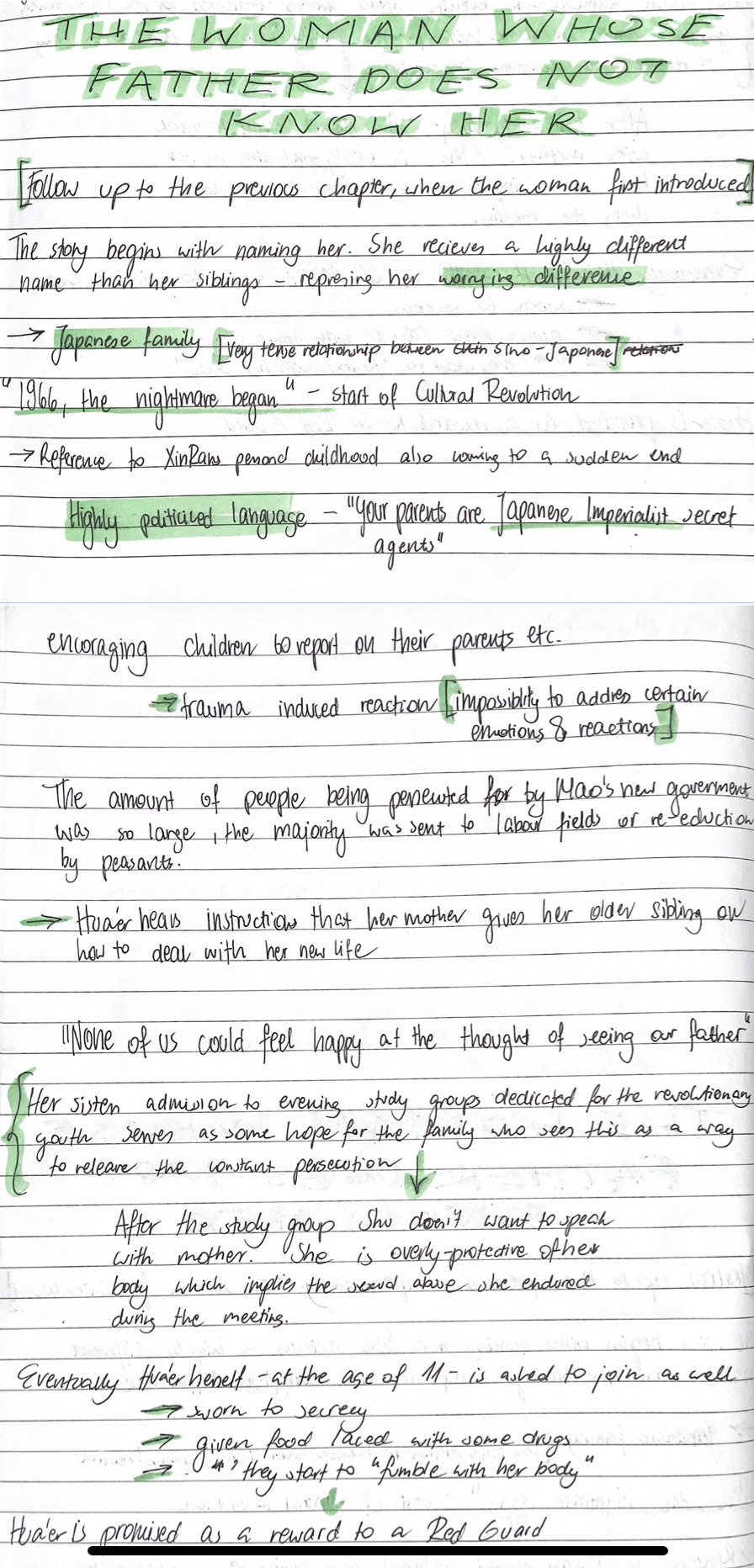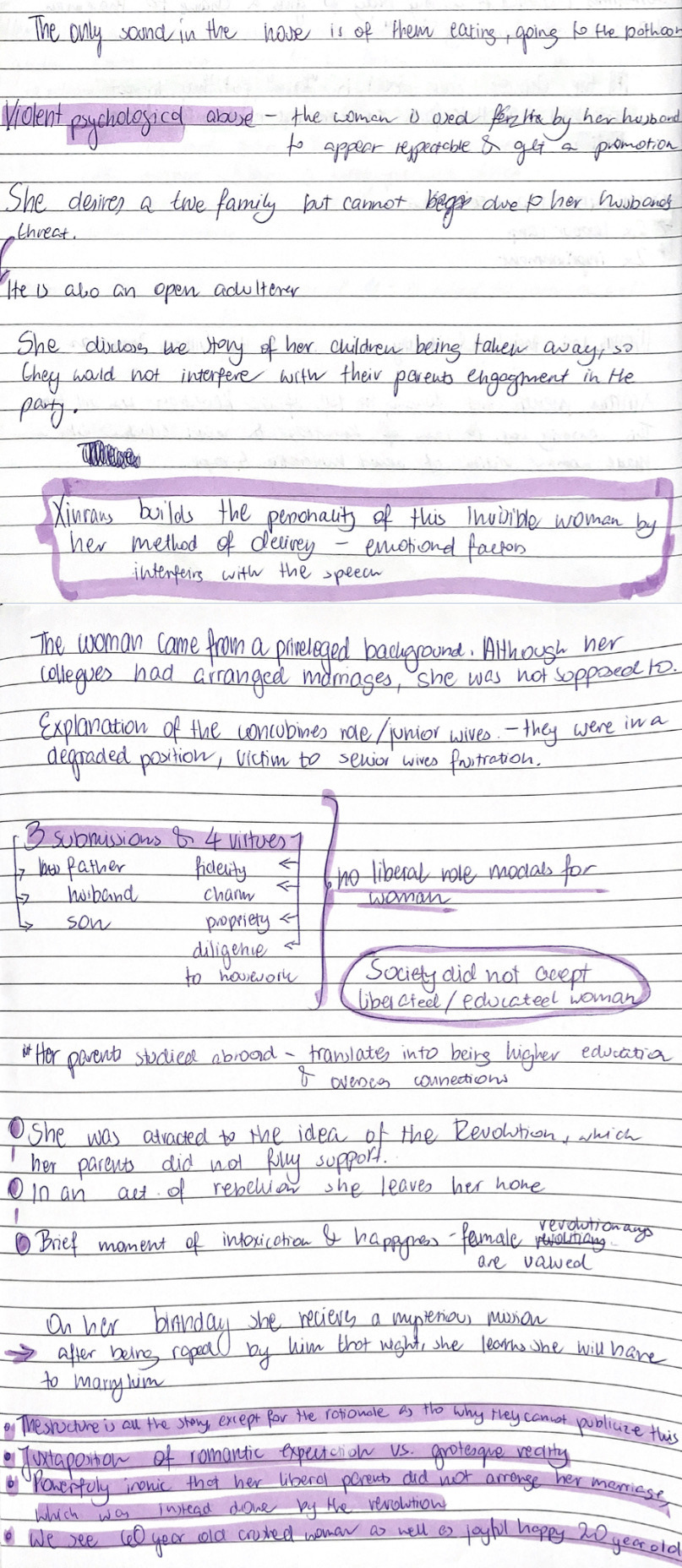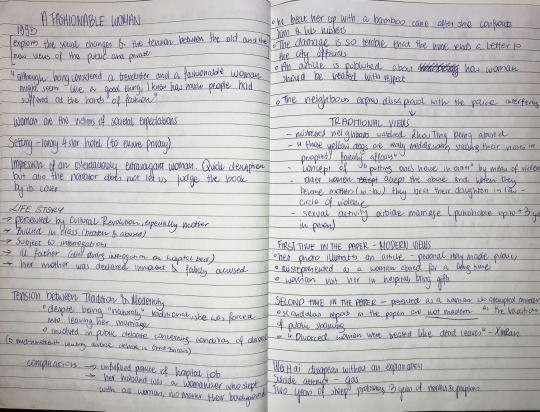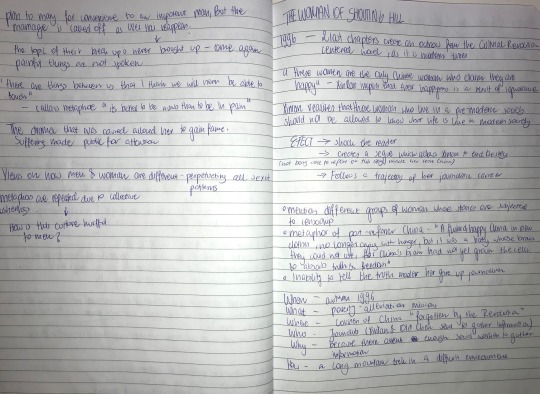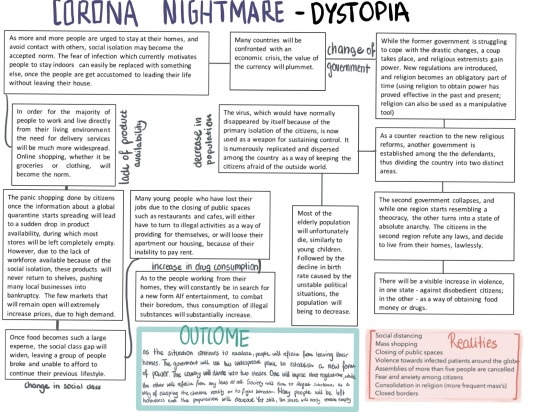Text
WIDE SARGASSO SEA - notes
During the classes, I took notes directly on my copy of the book so that it would be easier for me see the relation between the text and the themes mentioned. Other than that, I also noted key points and the family tree in my notebook.


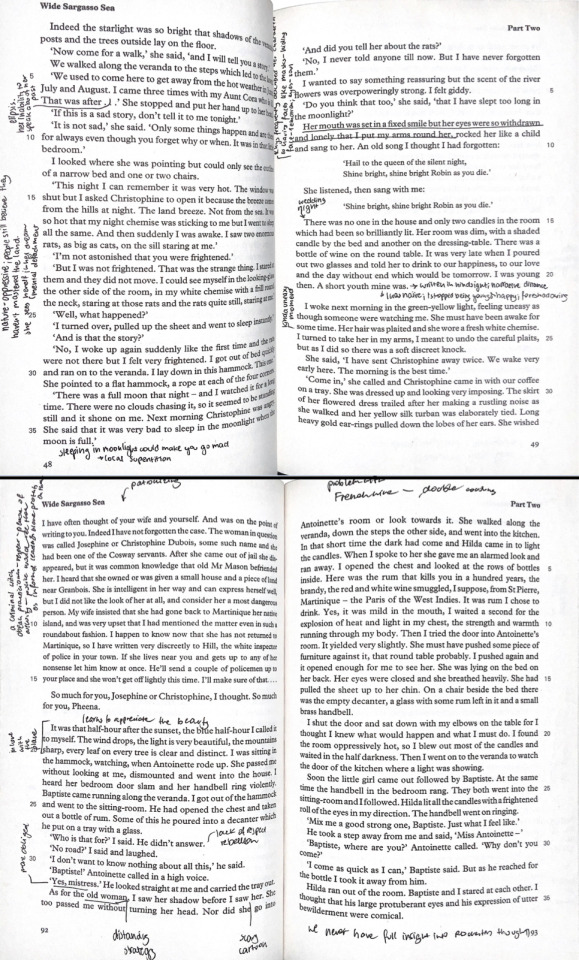
1 note
·
View note
Text





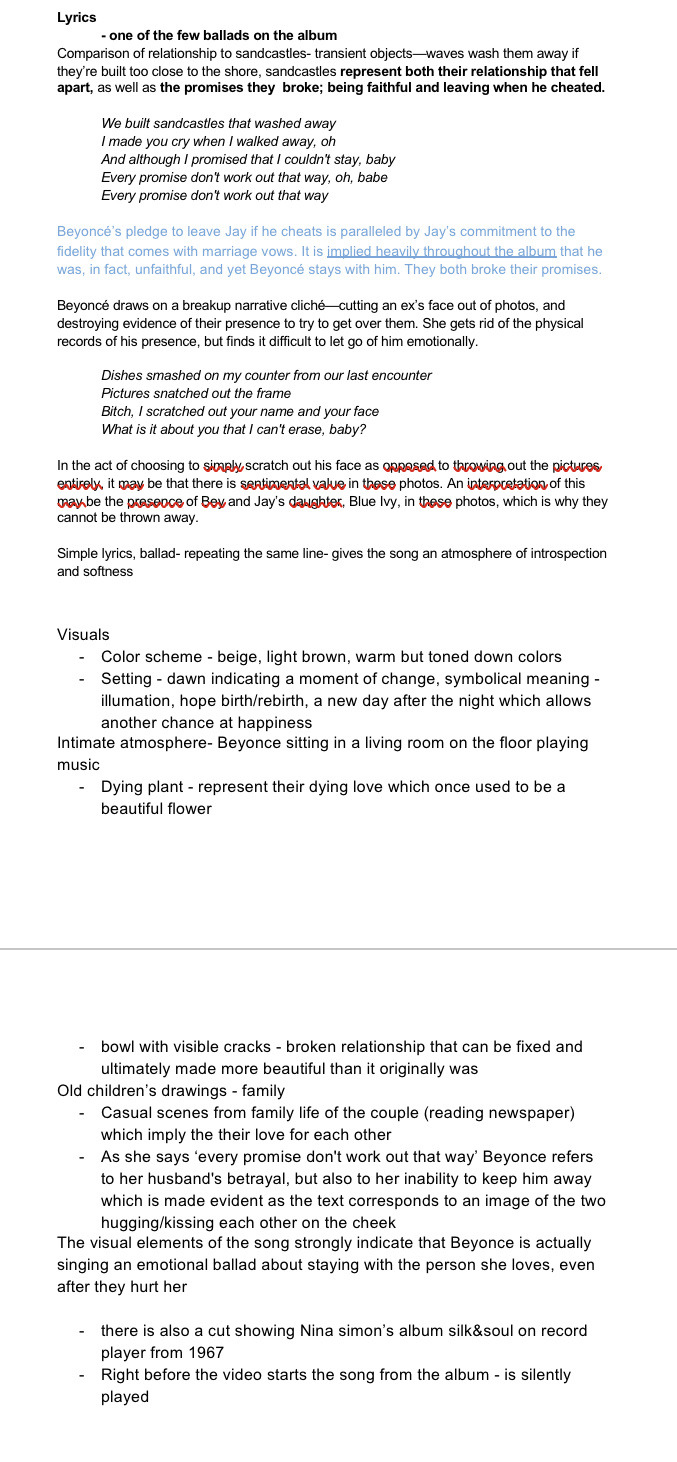

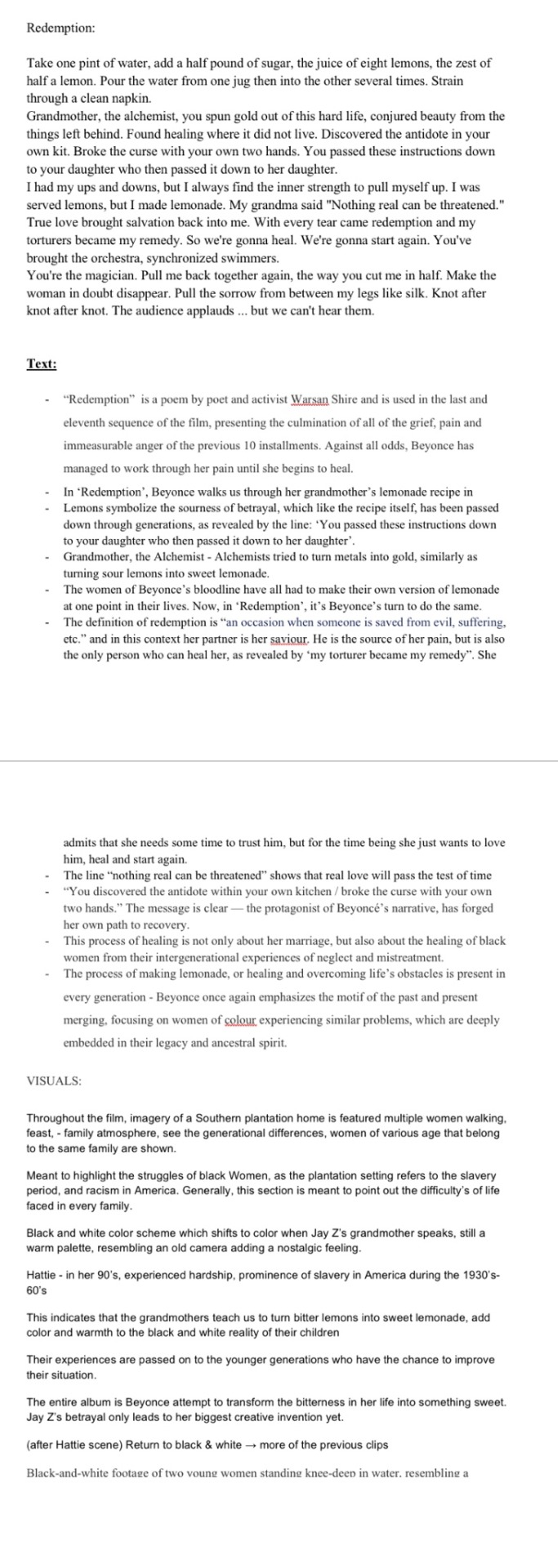

BEYONCÉ NOTES
These are the notes created by the four groups I was a part of throughout the Beyoncé classes. The songs : Hold Up; 6 inch; Sandcastles; Ressurection are analyzed
1 note
·
View note
Text
A DRY WHITE SEASON NOTES




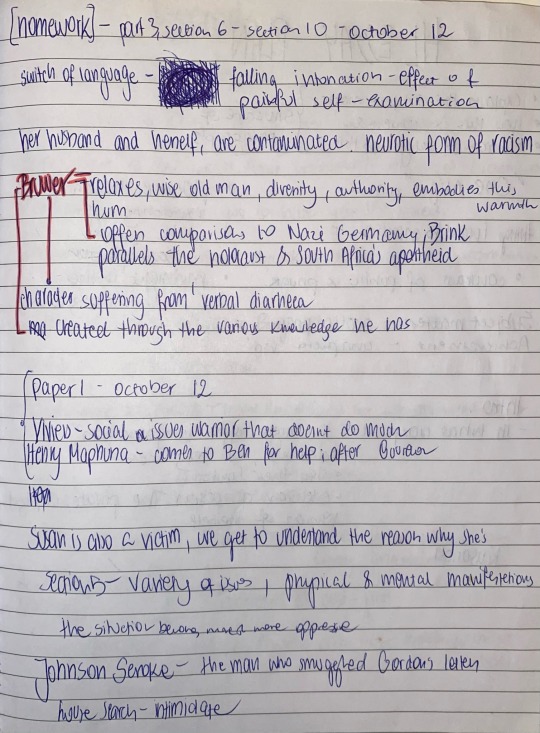
Half of these notes are digital because this was before schools resumed online teaching again and the other half of the book is noted on my usual notebook.
1 note
·
View note
Text
HL ESSAY OUTLINE
This is the slightly updated version, with incorporated notes from the previous version. I plan on improving the conclusion paragraph and reaching for some academic sources about “Kaisarion”, however, I have yet not had the opportunity to do so.
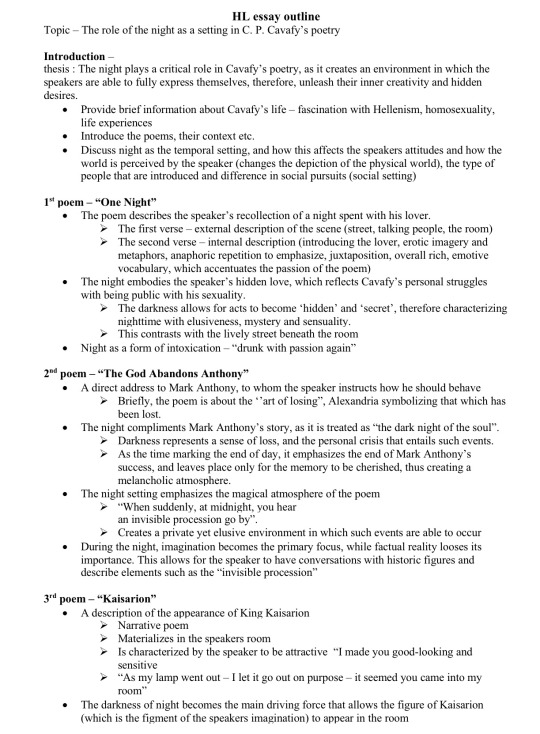
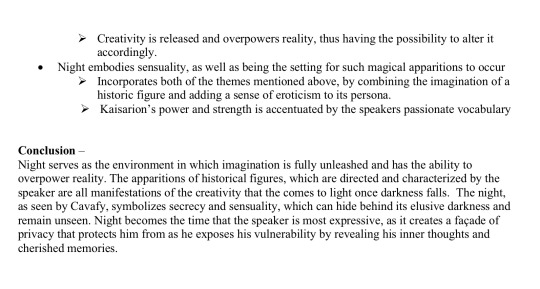
1 note
·
View note
Text
MOCK ORAL NOTES
In order to prepare as well as I could, I first decided to write down how I planned to structure the entire response. I wrote down full sentences and created a vague “transcript” of what I planned to say, in order to have an idea of how long each extract would be etc. Writing this text allowed me have a more clear idea of what I wanted to say and how it would look like, as well as engraved the points I wanted to discuss in my memory.
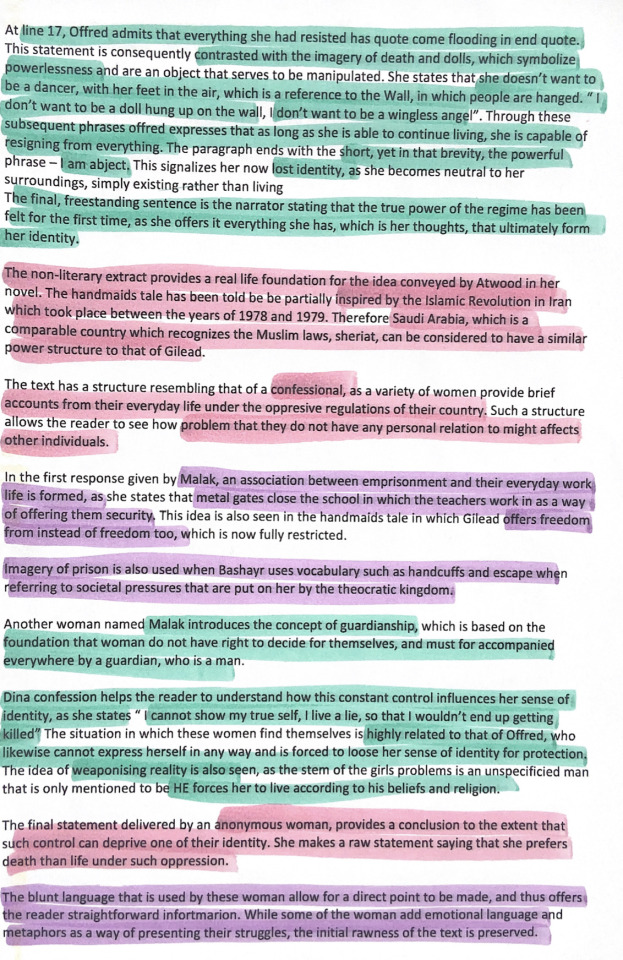

Once I knew more or less how I wanted to present the Mock Oral, I decided to break down the main points i was trying to make into a simpler table. I divided the information into 3 categories - Concrete Detail; Effect; Relation to Global Issue. This allowed me to be sure that every element of the text that i was mentioning had a relation to the topic of the presentation. This was the most helpful of the notes that I prepared, so in the future examination I plan to use this method again.
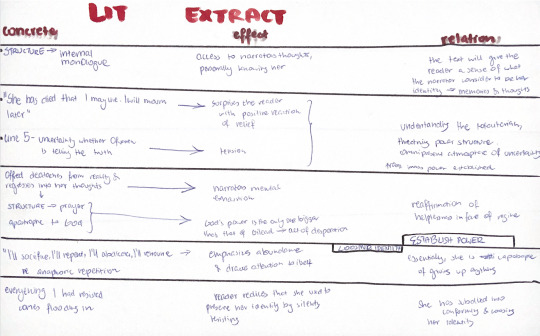

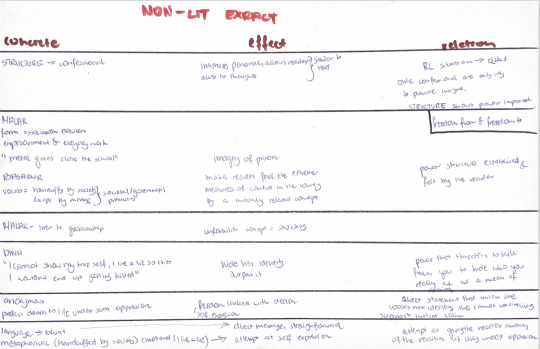
1 note
·
View note
Text
Mock Oral Outline
As a part of the process, I had to create an outline, which would help me keep on track with the oral response I would be delivering.

1 note
·
View note
Text
Mock Oral Extracts
For my mock oral extracts I decided to discuss a fragment from “The Handmaids Tale” and an article about the situation of women in Saudi Arabia.
LITERARY EXTRACT -

NON-LITERARY TEXT

1 note
·
View note
Text
NON LITERARY TEXT as a reference to “The Handmaids tale”
I chose an article by the New York Times which addresses the everyday problems Saudi Arabian women face. They collected the information via twitter, allowing a platform that will grant the confiding women anonymity. A few of the reports from the text i found particularly relating to the dystopic Gilead are as follows -
Al-Hasa
“He won’t allow me to work, even though I need the money. He also doesn’t provide all my needs. I can’t recall the last time he cared about what I needed or wanted. He is married to four women and completely preoccupied with them, and he doesn’t allow me to travel with my mother. I suffer a lot, even in my social life. He controls it completely and doesn’t allow me to have friends over or go to them. He forces me to live according to his beliefs and his religion. I can’t show my true self. I live in a lie just so that I wouldn’t end up getting killed.” — DINA, 21
Abha
“It’s like I’m in handcuffs, and the society, the law, the people [are] against us. That’s why most women choose to marry in their early 20s as a way to escape, and guess what? The man she marries is no different from her brother or father.” — BASHAYR, 19
Riyadh
“I have lived for a while in the West, and I found that the life of a woman is very difficult, for she has to bear heavy burdens that only a man can undertake. Whereas in our country, the man provides all forms of comfort for the woman.” — AFNAN, 30
Riyadh
“I have never felt in any way that there was something I wasn’t allowed to do. When you grow up in a society like Saudi Arabia, you get used to the rules and you work around them.
Unknown
“[My guardian] forbids visits to my female friends or going to shopping malls by myself. It is a complete and total isolation from all the joys in life.” — MALAK, 28
https://www.nytimes.com/2016/10/29/world/middleeast/saudi-arabia-women.html
1 note
·
View note
Text
REFLECTIONS – chapter 30, 31 and 40
Selected global issues discussed in the chapters-
IMAGINATION & IDENTITY
Chapter 30, which is a part of the larger section titled ‘Night’, is an exploration of Offred’s past memories. The night, in the life of a handmaid, is the only part of their day they have reserved for themselves. While secluded in the privacy of her own room, Offred drifts away in her own thoughts, randomly appearing her head. The darkness of night also allows brings up the poetic language used by the narrator. It seems as if during the harsh sunlight of the day, Offred can not allow for her imagination to affect the way she perceives her surroundings, but once the sun sets, and night falls (a vivid discussion at the beginning of the chapter regarding why it falls rather than lifts is a sign of this sudden creativity emerging from the narrator as well), Offred becomes more focused on her senses and imagination, and uses rhetorical devices or imagery to deepen the readers understanding of her current state. She allows her thoughts to be free at night, therefore after spending the whole day submissively, her internal monologue cannot stop resurfacing events from the past, all of which are loosely tied to each other. Only through these memories can Offred sustain her identity. After her entire life has ended, she clings on to her remembrance of the past. Her collective memories form her identity.
BELIEFS & VALUES
As she relives events from the past, such as the day her and her husband had to make the decision to kill their cat, Offred evaluates her thoughts regarding how the communal oppression affected ones moral rules, and set of beliefs. Once her and her husband are forced to flee the country as a means of survival, the couple realize they cannot abandon their cat, as her aimless wandering may give them away to the authorities. ‘’I’ll take care of it, Luke said. And because he said it, instead of her, I knew he meant kill.” In order to be capable of killing anyone, one must first deprive it of its humanity – dehumanizing it. Luke had to see their cat as an object, and obstacle standing in the way of their freedom in order to even physically be able to murder it. This comparably small event forms a parallel between the current Gileadean society, where every citizen is regarded to without consideration for their life. Almost as if they were pions used for achieving a larger goal, which is the survival of the human race. But what is striking in this unwavering mentality, is that the aim of continuing the human population is achieved through taking away the humanity of the people. Offred states –‘’they force you to kill within yourself”, suggesting that once in the eyes of anybody or anything, one become a statistic rather than a person, they may come to think of themselves in that manner as well, therefore killing their humanity themselves.
Beliefs in the terms of religion are also explored in this chapter, as it reaches it’s end with Offred’s prayer. Before starting, she has a flashback from when she was forced to harmoniously pray along with the other women in the Red Centre. The verse ‘’Thank you for not creating me a man” is a reference and reversal of a Jewish prayer during which men thank God for not creating them a woman. This allusion simultaneously adds irony to the text, as well as fulfills the role of emphasizing a social double standard. The idea that one should be thankful for not being a woman is already degrading toward the second sex. In the novel, the context in which Atwood places this phrase suggests that the reason why handmaidens should be thankful to be women, is because they can serve the men by bearing their children. Both the clauses are offensive towards women, but the reasons are completely different. However, in Offreds personal prayer, she leaves the formalities aside, and builds a more intimate bond with the God she is speaking to. “I wish you tell me Your name, the real one I mean.” The narrator implies that even God, who is ominously referred to by a single word, just like her, has an original name, one that has nothing in common with the function He has, or the role He plays. In her solitude, the narrator is overwhelmed with a sudden need for grounded intimacy. The prayer for Offred is a last retreat of sorts. She panics as it starts to end, terrified by the thought that perhaps her words have no listener and that indeed even at this moment she is alone. Unlike the prayers conducted at the Red Centre, Offred’s speech to God is purely her’s. She treats the concept of the prayer without its inherent sanctity, and allows herself this one moment of conversational relief.
COMMUNITY
By the start of chapter 31, which begins a new section titles ‘Jezebels’, Atwood comments on the social pressures imposed by the members of a community. She mentions ‘It should scratch makes on the wall, one for each day of the week […] but what would be the use, this isn’t a jail sentence’, thereby comparing her environment to a prison. Working further on this idea we can imagine all the inhabitants of the area are either prisoners or guards, and similarly to the community of a jailhouse, aside from the institutional laws, there are a set of social pressures created and regulated by the members of the oppressed community. An example of such an issue is Offred telling the time by the moon cycle, which consists of 28, the same number as that of a women’s menstrual cycle. Even though Offred opposes to the regime of the Eyes, in order to remain safe in her environment, she immediately associates the passage of time with her fertility. Another socially construct necessity is that for Serena to have a child. Of course the idea that she may genuinely want to have an offspring is anything but rules out, however by presenting Offred with the idea that if she wants to remain safe of the risk of becoming an Unwoman, she should consider disobeying the law and engaging in a sexual relationship with Nick, Serena must be somewhat influenced by how the other high-ranking Wives view her. The social pressures of the community become a larger factor than the actual set of rules regulated by the authorities and that are imposed on the people.
SEXUALITY & IDENTITY
Starting from chapter 30, Offred mentions her diminishing control over her own body and sexuality, nonetheless, it is in chapter 40 that these concerns become impersonated. In the previous chapter, Offred states –‘’my nightgown, long-sleeved even in the summer to keep us from the temptations of our own flesh, to keep us from hugging ourselves, bare-armed”. The clause indicates that women, specifically handmaids no longer have a right to their own body. The concept of sexuality is merely liquidated and urged to be forgotten, therefore, women are not even permitted to feel the touch of their own skin. Yet, this does not mean that one’s thoughts have to conform. ‘’They scent from the garden rises like a heat from a body’’, suggesting that it is against the nature of humankind to abolish sexuality. From an evolutionary standpoint, that trait is one of the reasons humans have survived this far, thus expecting that withholding temptation would be easier than withholding the urge to act or think is unrealistic.
The lack of human touch Offred has been struggling with manifests itself in chapter 40, when she arrives at Nicks door. There are two full versions of the events that took place in that room told by the narrator, nevertheless, both are said to be false. The various versions may lead to reader to question the reliability of the author. All being said, the Historical Notes section clearly indicates that since the narrator could not be traced, the events may fabricated. Yet the reason for the unclear string of events may be the emotional overload Offred faced upon entering the room. Offred’s statement “I am alive in my skin” is a clear suggestion that because of the lack of physical touch that narrator has experienced in the past years, the excitement that entails the experience may make the recollections more hazy and faded. False memories are also a factor worth considering, as from a psychological point of view, the sudden intimacy may have been a shock factor for the narrator, leading her to loose her grip on the objective reality and focus on her subjective experience. The final phrases – ‘’Is would like to be ignorant. Then I wouldn’t’ know how ignorant I was’’ means that the simple act of engaging in a sexual relationship, while Luke is still alive, is a burden on the narrator. She admits to needing love, nevertheless, cannot come to terms that she can somehow ‘replace’ her lost husband with Nick. This indicated that she regards her body and sexuality as something that has the possibility to belong to a certain person, rather then simply be hers. Later in the novel she explains that she loved Nick, and perhaps that is why she felt she had deceived Luke, yet at this moment, she is completely at loss with what her body is and who it belongs to.
0 notes
Text
TASK I - FIRST ADRESS: SANDY HOOK ELEMENTARY SCHOOL SHOOTING
Right after the Sandy Hook elementary school shooting reached the White House, president Barack Obama delivered his first statement regarding the event. The main goals in such an address would typically be to pay tribute to the victims and their families, as well as aid the entirety of the nation in regaining their lost sense of security. Obama definitely does not omit these two objectives during his speech, however his priority message seems to stress the emotional pain brought up by the event. This is made evident early on during the response when it is stated - ,, I react not as a President, but as anybody else would – as a parent”. Obama somewhat grounds himself whilst letting the grieving country know, that he too, understands the pain that has overwhelmed thousands of Americans. His main goal could be considered to be as simple as empathizing and expressing his support for the heartbroken nation.
This goal is achieved mainly by the president’s natural body language. There are several moments throughout the speech during which Obama wipes off a tear from his cheek or has to pause in order to prevent his voice from breaking. It is clear that simply talking about the incident can evoke an intense emotional reaction from him, that he struggles to hide while presenting the speech. These minor details assure the audience of the genuine nature of the words he speaks. Aside from the delivery, the content of the statement is equally emotive. First of all he unites the crowd, which he does by deciding not distinguish between those that were directly and indirectly affected by the shooting.
“So our hearts are broken today – for the parents and grandparents, sisters and brothers of these little children, and for the families of these adults who were lost.” This sentence implies that the suffering of the lost children’s families are not forgotten, that every citizen of the United States feels their loss, and can empathize with their pain, including himself. The emotional power of this sentence is also affected by the tricolon built from synthetons. This rhetorical device also adds euphony to the address, making it seem overall more striking and memorable.
The structure and goal of the speech seem to be very appropriate to the situation, as during a tragic moment, like this, the Obama does not hesitate to show his true feelings. This fact, being that the President is so deeply touched by the citizens loss, can be comforting for the grieving families. The rather concise form of the speech is surely a result of rapid need for addressing the situation. Obama also manages to include a short, yet powerful section during which he expresses his opinion regarding the restriction of gun control laws. I feel like even though this is a controversial topic in the United States, discussing it in the context of preventing such catastrophic events, is suitable, as it offers a form of solution to the grave problem. Obama also urges his audience to support each other, and to reevaluate their family relations, somewhat transforming what is the devastating aftermath of a school shooting, into an occasion to reach for mutual love and respect. All of these ideas add up together to form one vital role, which is to slightly relieve those suffering, due of the shooting, from their pain.
These ideas have the power to evoke an emotional response because of the use rhetorical devices that incorporated. Pathos seems to be ruling over this speech, as it greatly appeals to the audiences emotions. The use of anaphora combined with epistrophe also reaches that desired strikingly emotive effect. This is most visible one of the final paragraphs - ,,[…] to remind them that we are there for them, that we are praying for them, that the love they felt for those they lost endures not just in their memories but also in ours.” The speech comes to an end with a biblical allusion, common for statements delivered after a national tragedy. Obama refers to the words of the Scripture, that go as follows – ,,[…] Heal the broken-hearted and bind up their wounds”, as a method of offering comfort to the grieving families, as religion itself is the promise of life after death, which the parents of the young victims are surely yearning to hear. The overall nature of the speech comes of to be very adequate to the situation, which is extremely painful and sorrowful. Obama uses oratorical devices to fully express his ideas, and assist the mourning country in their recovery from the tragedy
1 note
·
View note
Text
TASK II - SECOND ADRESS: SANDY HOOK PRAYER VIGIL
Upon the aftermath of the Sandy Hook elementary school shooting, president Barack Obama delivered a speech for the prayer Vigil in 2011. The delivery, unlike with the first statement, was not based on the emotional response of the President, but rather relied on addressing global issues to find a common solution and achieve a sense of resolution within the public.
The speech begins with a direct jump into religious matters. After expressing his gratitude towards the community that is addressed, the President opens his statement with a biblical allusion to the Scripture. The statement begins, and ends with such a reference, thus creating the sense that throughout the speech, religious values are maintained and cherished. Indeed, religion does play a crucial role in Obama’s delivery. When people are faced with the idea of death, especially when confronted with the loss of a loved one, indulging in religious beliefs can be comforting. No matter how various the beliefs, how different the worshipped entity, religions have always answered the question that is so essential to our human existence, which is the - what lies beyond death? Obama is naturally aware of this fact, and reaches for religion to assure the families of the victims that the demise of their loved one is painful only for the ones that stay behind in this life, while the dead move on to ,,an eternal house in heaven’’. The closing biblical allusion also incorporates heaven imagery, as it mentions Jesus’s love towards children ,,[…] for to such belongs the kingdom of heaven”, now not only suggesting the pure existence of the divine afterlife, but also claiming that the children lost during the school shooting will find their way to that place, so unimaginably magnificent that it cannot be described by words.
Religion also appears in another segment of the speech, when Obama states that - ,,All the world’s religions – so many of them represented here today — start with a simple question: Why are we here? What gives our life meaning? What gives our acts a purpose? […]”. Subsequently, the president elaborates on the struggle we face while trying the answer these questions ,,unable to discern Gods heavenly plans”. However, the answer to all these doubts lies within family bonds. Obama connects the religious meaning of life with the most inherent earthly quality of all, which is love for ones family.
It is the value of family that is most extensively discussed in this address, during which Obama specifically emphasizes the meaning of parenthood in their community. The issue is first explored through simply explaining the feeling of becoming a parent as - ,,the equivalent of having your heart outside of your body, all the time, walking around”. Obama stresses the anxiety that entails parenthood, caused by the need to keep one’s child happy and away from harm. Nonetheless, the president momentarily drops the formal register of the speech, positioning himself as nothing more than a normal parent in the eyes of the public, when he claims -,,It comes as a shock at a certain point where you realize, no matter how much you love these kids, you can’t do it by yourself”. Only after conveying these thoughts can the idea that it is the responsibility of the whole community, even the entire nation, to care for every child individually and ensure their safety be put above anything else. The phrase “they are all our children” will be pursued throughout the speech to show that the death of these twenty children is a loss for every parent in the country, and that responsibility for well-being must be taken by every citizen individually. Obama also states that the role of our society is caring for its youngest generations, preparing them for life and allowing for their development. These singular ideas bring up the concept of the whole nation acting together as a family. And as it was mentioned above, in the paragraph regarding religion, love for one’s family is the most naturally good act one can even fathom.
Religion and family are intertwined with each other in the speech, one influencing the other, until both fall into place as an irreplaceable value in people’s lives. Obama urges the public to take a collectivist standpoint on the issue, and hopes that through religion, his public may find peace and tranquility in their love for their families.
1 note
·
View note
Text
Othello in the context of race and ethnicity
DEFINITIONS AND CONTEXT
The play written by Shakespeare in the XVII century is the very first whose black protagonist is portrayed in a positive way, allowing the text to acquire a vital role in the history of drama.
Yet the clarity regarding Othello’s race has not always been so unquestioned. As the play has been reproduced on stage thousands of times over the past centuries, so has the perception of Othello’s skin colour. Starting from the publishing of the play in 1622 the characters dark skin remained intact, up to the 1820’s when a scholar by the name of Samuel Taylor Coleridge published a paper in which he states - ,,Can we imagine him [Shakespeare] so utterly ignorant as to make a barbarous negro plead royal birth? […] It is a common error to mistake epithets applied by dramatis personae to each other as truly descriptive of what the audience out to see or know.” (Coleridge, 385). Following the release of this essay, Othello was depicted as light-skinned or bronzed until the 1870s. The problematic approach to the protagonist’s skin colour has been evident throughout history, as well as discussed in the play itself.
The term moor refers to somebody from the region of Arabia, Palestine or North Africa, generally speaking - Muslims. These people had the possibility to receive high ranks and gather large fortunes (just like our protagonist did)
OTHELLO’S RACE VIEWED FROM THE PERSPECTIVE OF SOCIETY
At the time, England’s population consisted almost entirely of white Europeans, and the few black people that lived in the area were heavily associated with negative traits such as dishonesty and hostility. Thus most of the literature created before the publishing of the Shakespearean drama, rarely incorporated characters of colour, and if they did, they were presented as evil, cruel villains, with the sole purpose of causing chaos and pain. Shakespeare’s play acknowledges society's perception of black people, but does not support it. Othello is consistently judged for his race, called racial slurs and undermined by people of lower rank, that nonetheless, feel entitled to insult the man.
This is most visibly conveyed in Act I Scene I of the play before Othello is even introduced. The reader/viewer witness a conversation between Iago and Roderigo during which they discuss the ‘unlawful, socially unacceptable’ marriage of Desdemona and Othello. In fact, most of the racially charged vocabulary comes from those two characters and Brabantio, who later joins the scene as well. However, it is evident that Othello has managed to gather respect in his position, as the Duke of Venice when praising him to Brabantio claims - ,, your son in law is far more fair than black” ( 1.3.291). Said as a compliment, but still undermining the man for his blackness, this is an ideal example of what Othello was usually faced with.
Common pre-existing stereotypes in the culture of XVII century England regarding black men, state that they tend to be overly jealous; are exaggeratingly passionate (hence unreasonable) and gullible. All these mentioned traits have been portrayed by Othello in his behaviour and used by Iago to manipulate him.
Fundamental concepts –
• Othello is generally respected as a military man.
• The Duke of Venice, a person of a very high rank, respects Othello’s opinions, treating him more seriously than his own senators, which is presented in the act 1 scene 3, where the dynamics between Othello, the Duke, and Brabantio are shown. One of the symbols of respect is that Othello was greeted first, before the senator.
• Although he is positively perceived, characters do not ignore his race, which makes him an outsider despite his behavior and status.
OTHELLO’S RACE REFERRED TO BY OTHER CHARACTERS
Starting from Iago, the character's name derives from Santiago, which is a symbolic title for people who fight against moors ( or moor-slayers ), meaning that he is by nature supposed to be opposed to Othello. Iago, being the villain he is, insults everybody around him, but he has a designated vocabulary reserved primarily to either describe or infuriate Othello, as he refers to him as an old black ram contrasting him with Desdemona represented by an ewe.
Desdemona on the other hand deeply admires her husband. Unlike what the people in her surroundings think, she is infatuated in Othello. Portrayed as one of the strongest feminine characters in Shakespeare, Desdemona opposes to her father's will, falls in love with a man her when socially it would have been unthinkable to do so and even follows him to war to Cyprus. Her defiant personality has led some to believe that her love for Othello was kindled by his race. Othello’s skin colour symbolizes his exoticism, creates an atmosphere of mystery and ambiguity around the man, and this is what attracts Desdemona the most. She is fascinated by him. Their love is also illustrated by the imagery of the night, representing Othello, adoring the day, symbolising Desdemona. Nonetheless, their romance will be testified against her, as Iago presents her rebellious personality as a reason for her to cheat on him, creating dramatic irony.
Emilia, as well as Iago, directly correlates Othello’s dark skin colour with his evilness. Most characters believe a black ‘outside’, meaning physical appearance, must be related to a dark ‘inside’, accusing him of malicious intents and cruelness, solely based on his exterior appearance.
Fundamental concepts -
• Most of the characters in the play refer to Othello using race- and ethnicity-centered epithets, i.e. “the Moor”, “the thicklips”.
• Characters that aim to present him in a negative way, like Iago, often use various animals with negative connotations, for instance, “Barbary horse”, or “an old black ram”.
• The dark color of Othello’s skin is used to symbolize sin and evil. For example, Iago uses the term “blackest sin”, and Emilia “blacker devil”.
OTHELLO’S RACE FROM HIS OWN PERSPECTIVE
In the face of constant judgment based on his physical appearance, it is inevitable for Othello to not think poorly of himself. In Act I Scene III, the character attributes his problems in expressing his language in a courteous manner to his years spent in the military, but as the play progresses, his insecurities start surfacing. By the time the reader reaches Act III Scene III, he states – ,,Haply (perhaps), for I am black
And have not those soft parts of conversation
That clamberers have” – thus blaming his racial identity for the qualities he lacks.
The phrase above reflects how self-doubting the character must have been of himself if at the moment when he is presented the biggest doubt of his life, he immediately turns to his ethnicity seeking for a part of him to blame, to point out what he was most afraid would happen. Othello, indeed, numerous times wonders why Desdemona fell in love with him, and even feels anxious about having such a lovely wife. The low self-confidence of the character ignited by years of racial marginalizing has made him an easy target for manipulation, as Iago manages to smoothly slide into Othello’s mind, pull out his biggest doubts, and without providing an explanation leave him to his thoughts.
The final monologue of Othello is also crucial in understanding his perception of himself. As he prepares the knife that will later lead to his death, he lays down his principles. He asks the witnesses to ‘’Speak of me as I am. Nothing extenuate/ Nor set down in malice” a final plead to be remembered by his service for the state, behavior and human, instead of skin color. Othello also makes reference to his race by including exotic metaphors, and his final sentances are as follows –
,,And say besides that in Aleppo once,
Where a malignant and a turbaned Turk
Beat a Venetian and traduced the state,
I took bt th’ throat the circumcised dog
And smote him – thus!”
As Othello retells the sotry of one of his many victories while serving for the state, he indicates that he, himself, has become an enemy of Venice. By degrading himself to the level of those he despised most, which is visible in the vocabulary he used to describe the enemy nation, he presents himself as equally worthless as those who he killed, and subsequently stabs himself in a deadly lunge. At his moment of death he identifies himself as a foreigner that despite their biggest efforts, never managed to become part of the society that so deeply rejected him.
Fundamental concepts -
• Othello often acknowledges his ethnicity, often combing it with some stereotype, like saying that he is a bad speaker because of his race: ”Haply, for I am black/ And have not those soft parts of conversation”
• He is conscious of the fact that he is an outsider, but he also knows that his service to Venice is important and that he is a trusted and successful soldier.
• In his final monologue he uses many exotic metaphors (dropping tears as fast as Arabian trees, Indian throwing a pearl away), a reference to his background.
OTHER LOCATIONS REPRESENTED
o Venice - a very well prospering place due to international trade. Its location by the sea not only enabled business connections but also allowed many cultures and races mix in the city. Venetians were considered very open minded at the time, as they emphasised work and their interests rather than religious values imposed by the church. As they liked to point out – “we are Venetians first, and Christians second”. The city was a place of ambiguous morals, perhaps the only city at the current time in which an interracial marriage, such as that of Desdemona and Othello’s, would be somewhat eligible.
o Florence - in Shakespeare’s time the city was considered to be the center of education. Cassio, a Florentine, speaks in a very elegant manner, which confirms this perception of Florence. A Florentine was also used to describe homosexuals and other males with high femininity levels.
o Cyprus - a place very different from Venice, as it is a fortified outpost. The island plays a very important role in the play, as the actions starts unfolding once the characters arrive. The size of the area is smaller and the political situation is uncertain enhancing the atmosphere of the island being a dangerous outpost unlawful territory, making it the perfect place for Iago to carry out his evil plan. Cyprus was also the birthplace of Aphrodite, a mythological goddess of love, which ties in with the themes of love and jealousy.
2 notes
·
View notes



